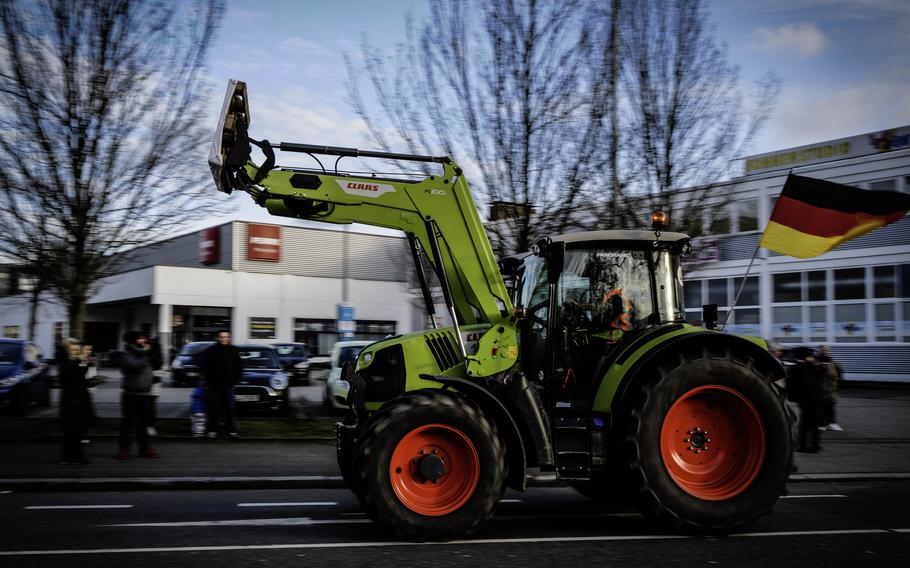
Farmers aboard their tractors roll down a main road in Kaiserslautern, Germany, on Jan. 8, 2024, highlighting their opposition against agricultural policy changes announced by the German government. (Stars and Stripes)
If the European Union’s leaders want to achieve the green transition in agriculture, Jonas Wappler is exactly the kind of farmer they need on their side. As the chief executive of a large crop-and-dairy operation that straddles the German states of Saxony and Thuringia, he’s capable of having an outsized impact. At 27, he’s young enough to see the results in his lifetime.
Instead, Europe’s wide-ranging agro-environmental reforms have made an opponent of him. “It’s greenwashing,” he says. “They’re playing politics at farmers’ expense.”
Wappler’s livelihood depends on the land, and he’s witnessed how climate change has adversely affected harvests. He rotates crops, fertilizes organically and employs precision farming to minimize harmful chemicals. Yet he says the EU’s Green Deal and associated Common Agricultural Policy, intended to repurpose farm subsidies as rewards for eco-friendly practices, have begotten abundant bureaucracy to little benefit.
Among other things, Saxony’s subsidy application entails an ever-expanding list of conditions, requiring extensive documentation of everything from crop spraying to the roughage content of animal feed. Extra-credit “eco-schemes” — aimed at, say, preserving added grassland or forests — impose their own requirements for uncertain payoffs. Politically driven rule changes make planning a fool’s game: At one point, Wappler spent 100,000 euros on tilling equipment to prepare for an herbicide phaseout that officials in Brussels subsequently reversed.
All the hassle might be justified if it were saving the planet. It isn’t. An EU audit recently found that member states’ agro-environmental plans wouldn’t come close to achieving its pledges for 2030, such as a 55% reduction in greenhouse gas emissions. Angry farmer protests embolden obstructionists on the political fringes, hobbling the EU’s centrist leaders even as Europeans overwhelmingly say they want more action to combat climate change.
For the EU, the solution is something that doesn’t come easily: Be less meddlesome. The bloc doesn’t have to change the ways of all its 9 million farms at once. Instead, it can target large, efficient operations like Wappler’s. The mere 7% of farms with more than 100,000 euros in annual revenue account for 76% of the EU’s agricultural output. By gaining their cooperation, officials could achieve the greatest impact with the least political and administrative disruption.
How, then, to win them over? For one, pay better. Farmers are being asked to remedy environmental harms sometimes perpetrated by long-gone predecessors. Eco-scheme payments often don’t cover their costs. Compensation should be predictable and generous enough to supplant regular subsidies and ensure near-universal participation — perhaps even encouraging some farms to specialize in ecological services, such as carbon capture.
Second, improve the rules. An overly prescriptive approach can be self-defeating. Better to establish desired outcomes — such as diverse flora and fauna, or reduced erosion — and allow farmers flexibility in achieving them. The Netherlands, for example, allows participants to mix and match eco-scheme measures to reach bronze, silver or gold status and provides upfront estimates of the attendant rewards.
Third, don’t waste farmers’ time. All too often, they must report the same information in different formats to multiple authorities. Wappler has had to grapple both with Saxony’s notoriously glitchy portal and Thuringia’s separate system. Harmonizing reporting — and keeping rule changes to a minimum — would help reduce the burden and avoid unpleasant surprises.
Officials acknowledge such flaws. Saxony is working on its portal and advocating simpler rules and more remunerative eco-schemes. Germany’s agriculture ministry has made some tweaks in response. EU officials have started a “strategic dialogue” on agricultural policy, and promised to slash red tape. So far, though, their actions have been largely counterproductive. Moves such as reversing fallow-land requirements or reinstating diesel subsidies, albeit welcome by many farmers, prolong environmental harm.
No matter how well the EU’s agricultural rules are designed, many smaller farms will still struggle. Subsidizing fundamentally unviable operations that lack the capacity to meet environmental requirements isn’t sustainable. Cutting them off could be socially and politically catastrophic.
Mark Whitehouse is a member of the editorial board covering global economics and finance. This column does not necessarily reflect the opinion of the editorial board or Bloomberg LP and its owners.